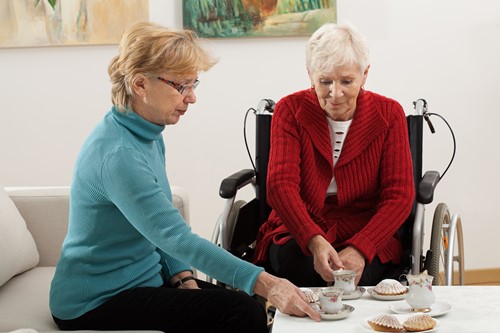- A residential care home provides the care and support you would receive at home from a carer.
- Staff can help with personal care such as washing, bathing or showering, getting up, dressing, and support with eating and drinking.
- Help is available 24 hours a day and meals are provided, usually with a choice of main meal.
- Activities and outings are usually available, and visitors are always welcome.
- Care homes aim to help you to lead an independent life in as homely a setting as possible.
Residential and nursing care homes
- Home - Connect to Support
- Care options
- Residential and nursing care homes
If you can no longer be safely supported to live at home and are thinking of moving to a care home, you are faced with some important decisions and choices. This section will help you to gather information and ask the right questions before making your decision.
Decisions and choices
You may be thinking about moving into a care home because you're finding it difficult to cope at home. It may be that the person who has been caring for you is no longer able to. Wherever possible, care and support services will help you to continue living at home. But, in some cases, it may be that residential or nursing home care is the best option for you.

- Care homes with nursing generally care for people who have complex or changing care needs and need the sort of care that can only be provided under the supervision of a qualified nurse.
- By law, care homes with nursing must have a qualified nurse on duty 24 hours a day. In West Sussex, most care homes with nursing are owned and managed by independent organisations.
- Some care homes offer accommodation and care for people who need either residential or nursing care.
- You may want to choose one of these so that you do not have to move to a different home if your condition gets worse. Also, if your partner has different needs from you, you may still be able to go into the same home.
Directly Provided Services - residential
West Sussex County Council's Directly Provided Services offer a range of residential services. The care and support offered is high quality and tailored to what the person needs.
Can I choose the care home?
The choice of home is very personal and what suits one person may not suit another. If you are paying for your care, you may choose any home that you can afford to pay for. If we are paying for your place in a care home, you may choose any home as long as:
- the accommodation is available
- the accommodation is suitable in relation to your assessed needs
- the cost of your care is not more than the amount specified in your personal budget for accommodation of that type, or if it is more expensive, you or someone else on your behalf agrees to cover the extra cost for the full length of your stay
- the provider of the accommodation is willing to enter into a contract with us to provide the care at the rate stated in your personal budget.
When choosing a care home, you should consider what is important to you.
We encourage you to visit several homes so that you can compare them.
You may want to live in a local home to be near family, friends or the local church or health centre.
- the current CQC report and rating for the home
- whether there is a registered manager
- whether the staff appear caring and attentive
- whether the residents seem happy and involved
- whether there is clear information on how to make a complaint.
- A care home will normally offer you a single room
- Some homes will offer you your own bathroom, but in others the bathroom and toilet are shared
- Some homes have double rooms for couples or friends to share, but you should normally only have to share a room if you want to
- As well as your room, the care home will provide a lounge, dining room and other shared areas.
Moving into a care home is likely to be a big change for you, your relatives and your friends, so it is important for you to see a familiar face.
To help you feel at home, you should be able to welcome visitors in the same way you did in your old home.
Care homes should support visits and staff should make it as easy as possible for your relatives and friends to visit.
They should respect your relationship and give you as much privacy as they can.
Generally, care home fees cover all the normal things a registered care home or nursing home would be expected to provide for you.
The care home should not normally ask you to pay any more for your daily living costs.
You may, however, have to pay extra for hairdressing, dry cleaning and newspapers.
You will have to pay for your own personal items such as clothing and your choice of toiletries.







